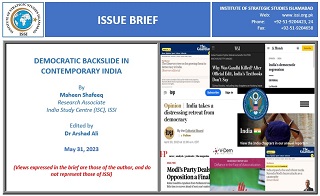Over the past many decades, India has projected itself as the world’s ‘largest democracy’ with a ‘secular’ outlook. India’s post-independence political sphere was based on Nehruvian political ideology that endorsed secularism as a strength of the Indian nation.[1] However, today’s India has gone far off-track from what were commonly described as the ‘founding principles.’ Instead, the current ruling RSS-BJP dispensation has embraced a ‘Hindutva-led’ exclusionist ideology. In recent months, prominent Western media outlets have commented on this shift and the implications of a continuous democratic ‘backslide’ in India. Their analyses and assessments map the nose-dive of freedom in India.
An analytical piece in the Foreign Affairs in April 2023 briefed about the stifling of democracy in India. The author noted that opposition was a hallmark of parliamentary democracy; however, the expulsion of one of India’s most prominent opposition leader Rahul Gandhi from parliament by the BJP undermined the important symbol of democracy in India.[2] The Guardian carried an editorial titled ‘The Observer view on the growing threat to democracy in India.’[3] It highlighted as to how the BJP government had taken measures to reduce the influence of the opposition and dismissed the playing-level field for democratic forces. The editorial mentioned the defamation case against Rahul Gandhi and stressed the biased role of courts in Gujarat in sentencing him, where the current Indian prime minister served as a chief minister from 2001-2014.[4] The editorial concluded by stressing that it was difficult not to view the court’s verdict as ‘politically motivated.’
















